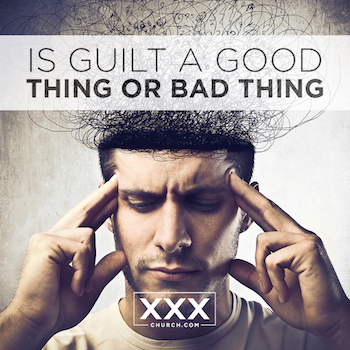 I sat across from the small, kind, man with the aged brown skin and the silver ponytail, pouring my heart out about all my issues surrounding porn addiction and depression and anxiety, and he did what most therapists do well: listened.
I sat across from the small, kind, man with the aged brown skin and the silver ponytail, pouring my heart out about all my issues surrounding porn addiction and depression and anxiety, and he did what most therapists do well: listened.
But then he did something most therapists don’t: he shook his head.
I paused and asked, “What?”
“You Christians,” he said. “So much guilt and shame. It’s the most worthless thing in the world.”
I sat there and thought this was like something out of an old Seinfeld episode: “Yeah. What’s the deal with us Christians?”
No one talks about grace, love, and forgiveness more than us Christians. And no one seems to feel more guilt and shame. What’s the deal with that? We quote verses that say that nothing can separate us from the love of God, all things are permissible, we can do all things through Christ who strengthens us, and God’s grace is sufficient for us. And then we feel so much guilt, it’s like shame is an odd creature occupying that extra seat in the minivan on the way to church on Sunday. And it just keeps telling us to get our crap together… or else.
The problem is that when we talk about guilt, we are talking about an emotion that is felt and experienced based on deep, unconscious beliefs we have about ourselves. If in your unconscious, you believe you are bad (like some of the more toxic Christian theology seems to categorize you as) then guilt emanates from that wound. In other words, guilt is born in the unconscious wounds in our souls.
At some point, in some way, we were told we were bad. Guilt is born in that dark shadow. (Tweet This!) We don’t feel guilt because we think we should; we just feel it. And that feeling is not of an orderly and enlightened nature that brings us into harmony with what we were meant to be. It is chaos. Guilt cycles on itself, almost feeding on itself, until we either stumble downward into acts of self-abuse (because we unconsciously believe we deserve them) or we adopt an ordo salutis: an old Latin term meaning “Order of Salvation.” This term is sometimes used to refer to a particular interpretation of the order and method in which God saves humanity through the atonement of Christ, but in this case, I am referring to structures we design in our unconscious to pacify, control, and appease the guilt and shame that attack us night and day in order to make our world a functional mess.
So often, we who seek to help people with addiction to porn or sex end up providing them with an ordo salutis. We give them groups to attend, books to read, software to buy, churches to serve in, and prayers to say: all good things unto themselves. But if they are used as a mechanism to control the guilt and pain, then we have simply made a way for them to continue to live asleep but alive, unconscious to everything happening at the deepest levels inside of them. All that “help” can have a numbing effect on the pain.
My therapist said to me once after a long period of silence, “You’re not a bad person Seth.” It was a strange thing. And miraculous. He allowed me to see myself as I was, but had not realized: good. An object of Divine love and a carrier of the Image of the Creator. And when I saw that, I was able to see more clearly what it was I was doing in my addiction to pornography. My eyes were opened – my consciousness moved into the light of the Spirit of Truth.
When a person knows they are good, transformation can come rapidly and powerfully. (Tweet This!) And guilt is a function of pain and darkness. If you feel guilt and shame because of what you are doing, please know this: you are not this person you seem to think you are. Your guilt is no good here.
Sign up for a preview of a brand new video series coming out from Seth and XXXchurch.com at www.mypilgrimage.com

Is Feeling Guilty a Good Thing? by Seth Taylor is licensed under a Creative Commons Attribution-NoDerivatives 4.0 International License.
Based on a work at https://xxxchurch.com.

